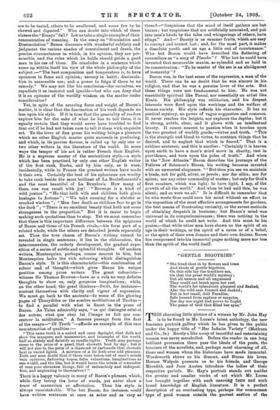"GENTLE BIGOTRIES."
"She lived shut in by flowers and trees
And shade of gentle bigotries.
On this side lay the trackless sea, On that the great world's mystery ; But all unseen and all =guessed They could not break upon her rest.
The world's far splendours gleamed and flashed,
Afar the wild seas foamed and dashed; But in her small, dull Paradise, Safe housed from rapture or surprise, Nor day nor night had power to fright
The peace of God that filled her eyes."
THIS charming little picture of a woman by 'Mr. John Hay is to be found in Mr. Lucas's latest anthology, the new feminine portrait gallery which he has given to the public under the happy title of "Her Infinite Variety" (Methuen and Co., 5s.) Surely a like array of beautiful and entertaining women was never marshalled. Before the reader in one long brilliant procession there pass the ideals of the poets, the heroines of the novelists, and, perhaps most charming of all, those real women whom the historians have made immortal. Wordsworth shows us his dreams, and Burns his loves. Horace Walpole presents us to his friends, and George Meredith and Jane Austen introduce the ladies of their respective periods. Mr. Hay's portrait stands out amidst the greater and smaller works of art which Mr. Lucas has brought together with such unerring taste and such broad knowledge of English literature. It is a perfect description of an everlasting type, perhaps the commonest type of good woman outside the poorest section qf the
community. She is the product of the highest civilisation aeting upon average material. For such a one the trackless seas of speculative thought do not exist, and the mysteries of life which more and more confound the thoughtful are hedged out by a screen of time-honoured assurances. Yet the limits necessitated by this complete protection have deepened her nature and nourished her heart, while they have narrowed her outlook upon life. It is true that for her the universe is small, and measurable by many a sacred rule-of- thumb. Nevertheless, she has some knowledge of the infinite, some knowledge which comes of homely love without learning or logic. One reason is as good as another for those who are certain. Not seldom they stick to the most familiar, simply because it has become to them the easiest expression of the fact. As we move among Mr. Lucas's pictures, we find our- selves continually glancing back at the woman with the peaceful eyes expressive of "gentle bigotries." Continually we compare others with her to their disadvantage. To very few of us nowadays is she the ideal, but to very many she is still the norm.
Near to Mr. Hay's lady in the same section of the book, and under the same heading of "The Gentle," we find a good many less striking persons, all of whom, however, have some- thing of the same effulgence. It is a delight to see again that friend of our childhood, Mrs. Ewing's Madam Liberality, and Henley's humorous but tender sketch of the elderly district visitor :—
"Prim is her gown and quakerlike her shawl.
Well might her bonnets have been born on her.
Can you conceive a Fairy Godmother The subject of a real religious call ?"
On the next page we come to " Lucy Lyttelton," who died in 1744, and whose epitaph is anonymous. Apparently the lady
was renowned for her lovely singing voice, yet
"Her eloquence was sweeter than her song,
Soft as her heart, and as her reason strong."
Her manners also were fit to "engage all hearts "- "Polite, as all her life in courts had been, Yet good, as she the world had never seen."
One would have liked to see kind Mrs. Cowper in this group, but we find her among "Mothers." Cowper's poetry is not the fashion just now, and those few young people who read
poetry in these days do not seem to know him at all. Perhaps none of his poems give so true and complete an impression of his personality as we get in the beautiful lines to his mother's portrait. We understand as we read how the
memory of the sweet face which "solaced" him in childhood had still power to soothe the gentle and sensitive man of genius, seldom free of the torture of religious depression,— " Always from port withheld, always distress'd"; never long in calm waters, but
"Tempest-toss'd, Sails ripp'd, seams op'ning wide, and compass lost."
A very different picture stands next to this. We see, "by epistolary illumination," Susanna Wesley, that mother of heroes, and, despite the affection borne her by her sons, perhaps the most repellent of all good women. Mr. Lucas allows the reader to condemn her out of her own mouth. She explains at length in a letter to her son the methods upon which she guided her family from the cradle to the grave, as one might truly say of the majority of them, for out of nineteen only six survived. These poor little boys and girls
were put early "into a regular method of living." "When timed a year old (and some before) they were taught to fear the rod and to cry softly." They had to sleep and wake, and eat and drink, and pray, believe, and learn exactly as they were told, and they seem to have been at one or other of these exercises during the whole of both day and night. When they were ill—think of the thirteen who died—" there was no difficulty in making them take the most unpleasant
medicine; for they durst not refuse it, though some of them would presently throw it up." In presence of this theologian and tyrant one longs once more for the "gentle bigotries" of another type.
Among the ladies described as "Good Company" we meet some most amusing people, chief among them, perhaps, Lady Ashburton. Mr. Lucas gives us two pages of her sayings, witty, bitter at times, and always full of a delightful abandon.
We will confine ourselves to three quotations. "There is no rebound shoat her : it is like talking into a soft surface." He "looks all a woman wants—strength and ceuelty." "I am strongly in favour of Polygamy. I should like to go out, and the other wife to stay at home and take care of things, and hear all I had to tell her when I came back." The only adverse criticism we could find it in our hearts to make upon this book is upon its arrangement. Why was the "Good Company" section not made to cover more names ? Surely Mrs. Jordan, and Sydney Smith's "literary woman," who was "as decidedly handsome as if she were pro- foundly ignorant," and some of those amazing old Scotch ladies whom Lord Cockburn and Dean Ramsay set before us, all come by right under that slescription. Leigh Hunt's picture of Mrs. Jordan we cannot forbear to quote :—" She was neither beautiful, nor handsome, nor even
pretty, nor accomplished, nor 'a lady,' nor anything conven- tional or comae ii faut whatsoever, yet was so pleasant, so cordial, so natural, so full of spirits, so healthily constituted
in mind and body, bad such a shapely leg withal, so charming a voice, and such a happy and happy-making expression of
countenance, that she appeared something superior to all those requirements of acceptability, and to hold a patent from Nature herself for our delight and good opinion." Are the girls of to-day as charming, and will they when they grow
older be as entertaining as the women of the past? Perhaps
they are, and probably they will be ; but just now there are some disagreeable types who make themselves very con.
spieuous. Possibly they are less new than we think. Steele tells of Madam Martha, who "learns by Reports of People of higher Quality new Ways of being uneasie and displeased " ; and Addison says :—" There is nothing so bad for tbe Face as Party.Zerd. It gives an ill-natured Cast to the Eye,
and a disagreeable Sourness to the Look ; besides, that it makes the Lines too strong, and flushes them worse than Brandy."
Let us look at the best and youngest of the hour. When
Mr. Andrew Lang wrote a poem upon Joan of Arc be unwittingly described—and idealised—the very newest type of young woman of to-day, as strong and as tall as her brother, who lacks nothing we could desire except that subtle femininity which charmed the Victorian world :—
"The honour of a loyal boy, The courage of a paladin, With maiden's mirth, the soul of joy, These dwelt her happy breast within.
From shame, from doubt, from fear, from sin, As God's own angels was she free; Old worlds shall end, and new begin To be."
Oddly enough, it is not under Mr. Lucas's "Ideal" section that we look for the woman who is through all the ages most liked by men. Mr. Lucas has placed her under the unattractive heading of "Paragons." "Her singularities were always to advantage, being unlike her neighbours only by being
better." The ordinary man—not the man of fashion—does not want originality, be demands a certain conformity ; but
he does want goodness, only it must be the goodness of the boar, not a pioneer goodness, and not the goodness of yesterday.















































 Previous page
Previous page